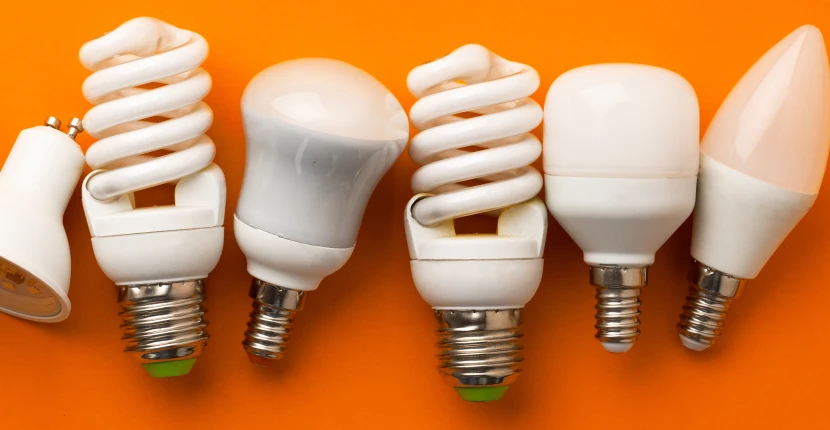Light Bulb Recycling: Everything You Need to Know
- by Joe Weber - updated on 9/1/2025

When it's time to replace your old light bulbs, don't just toss them in the trash. Many bulbs contain materials that can be harmful to the environment if not disposed of properly. Recycling light bulbs is a simple way to reduce waste and prevent hazardous materials from entering landfills. And when you're ready to swap out those old bulbs for something new—whether it's fall, spring, or anytime in between—we've got you covered. At Batteries Plus, we make the entire process simple, convenient, and cost-effective.
Key Takeaways
- CFLs, fluorescent tubes, and LEDs should always be recycled
- Incandescent and halogen bulbs can usually be discarded in the trash
- Recycling prevents mercury and other materials from harming the environment
- Businesses can streamline recycling with mail-back kits and bulk services
- Batteries Plus offers in-store recycling for individuals and tailored solutions for businesses
Why Recycle Light Bulbs?
Recycling is about more than just reducing waste—it's about protecting your health, your community, and the planet. Mercury and other hazardous substances found in certain bulbs can contaminate soil and water if they're sent to landfills. Even bulbs without toxins contain materials like glass, metals, and plastics that can be reclaimed and reused, reducing the need for raw material extraction.
Batteries Plus helps you do your part by offering convenient in-store recycling, making it easy to handle lighting upgrades responsibly while supporting a cleaner, more sustainable future.
What Types of Light Bulbs Can Be Recycled?
Not every bulb belongs in the recycling bin, but most bulbs can be recycled at Batteries Plus. Fees may apply to certain items. Here's a quick guide:
- Fluorescent (CFLs & Linear Tubes) – These bulbs contain small amounts of mercury, making them hazardous if broken or discarded improperly. Batteries Plus recycles them safely to prevent environmental harm and meet disposal regulations.
- LED Bulbs – Though LEDs don't contain mercury, they do house valuable electronic components. Recycling them helps recover these materials and keeps electronics out of landfills.
- Halogen Bulbs – These can typically be disposed of with your household trash, but recycling is the more eco-friendly option. Batteries Plus accepts many halogen types at participating locations.
How Do You Recycle Light Bulbs?
Recycling your old bulbs is easier than you might think. Many Batteries Plus locations accept used light bulbs for safe and responsible disposal. Simply bring them in-store—no appointment necessary—and our team will take care of the rest. We take the guesswork out of proper handling and ensure everything is disposed of in full compliance with safety and environmental regulations.
Business Light Bulb Recycling Solutions
For businesses, disposing of large quantities of bulbs can be challenging. Batteries Plus makes recycling easy with bulk recycling solutions, mail-back kits, and customized business accounts designed to streamline the process. Whether you're a facility manager, contractor, or small business owner, we've got programs to fit your needs and your budget.
Contact Your Local Store Today or Set Up Your Business Account
Benefits for businesses:
- Safe and compliant disposal of fluorescent tubes and other bulbs
- Customized recycling programs for ongoing needs
- Access to thousands of other lighting products and upgrades
- And more!
Pro tip: Most common bulb types are accepted, though recycling fees may apply for certain items. Always check with your local store for accepted bulb types and pricing.
FAQ
Q: Can I recycle light bulbs at Batteries Plus?
A: Yes. Most Batteries Plus locations accept a variety of bulbs, including CFLs, fluorescent tubes, and LEDs. Contact your local store for details.
Q: What happens when you shatter a fluorescent light bulb?
A: Fluorescent bulbs contain a small amount of mercury, which can be harmful if released. If you break one, ventilate the area, carefully clean up the pieces using gloves and sticky tape (not a vacuum), and place the debris in a sealed container for proper disposal. Always wash your hands thoroughly afterward. For safe disposal, bring the remains to a Batteries Plus location that accepts broken bulbs.
Q: Do LEDs need to be recycled?
A: Yes. While LEDs don't contain mercury, they do contain electronic components that should be recycled instead of thrown away.
Q: Is there a cost to recycle bulbs?
A: Some recycling services may include a small fee, especially for fluorescent tubes. Check with your nearest Batteries Plus for pricing.
Q: How do businesses handle large volumes of bulbs?
A: Batteries Plus offers bulk recycling services for our business accounts to simplify the process and save you time.
Q: Can I buy new bulbs while I recycle my old ones?
A: Absolutely. Batteries Plus carries a wide selection of replacement bulbs for every need, making it easy to recycle and restock in one trip.
Brighten Your Space and Recycle Responsibly
Seasonal glow-up or full-on lighting revamp, we've got the perfect solutions all year long. When you upgrade your bulbs, don't forget to bring the old ones back to Batteries Plus for safe and responsible recycling. It's an easy way to protect the environment while keeping your home and business shining bright. Plus, you can shop our huge selection of lighting products at the same time—making Batteries Plus your one-stop shop for recycling and replacements.